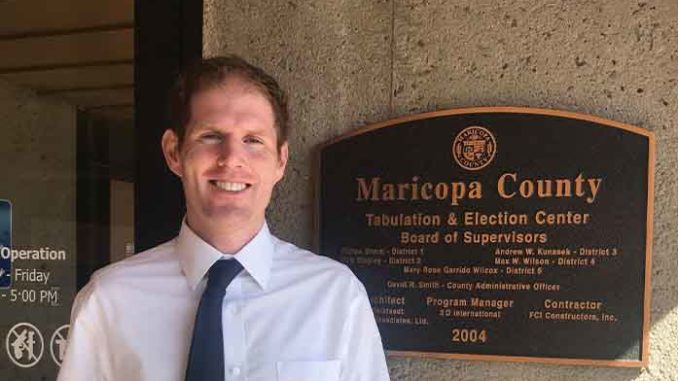
Maricopa County Recorder Stephen Richer laid out a detailed proposal last week for revising several areas of Arizona’s election laws. But whether any legislators turn the recommendation into bills remains to be seen, as very few have issued any response.
In a 28-page proposal. Richer noted that after being responsible for certain aspects of Maricopa County’s election process the last two years he now believes Arizona’s election administration “can and should be improved. This is true of both operations and law.”
His proposal, which runs the gamut from controversial to mundane suggestions, is intended to revise the state’s election system to allow Arizonans to know who is winning “within 24 hours” of polls closing while balancing the desire of voters for convenient options for casting their ballots.
Richer, who is president of the Arizona Association of County Recorders, made it clear his proposal is “not necessarily” representative of the views of the other 14 county recorders. He also acknowledged that some of his proposals would impact smaller counties.
One of the issues Richer delves into is early voting, whether by having early ballots mailed to a voter or early in-person voting at a polling place.
According to Richer, the number of voters who received an early ballot in the mail but returned it in a drop off box on Election Day rose nearly 70 percent from 2020 to 2022. Those thousands of ballots, referred to as “late early ballots” cannot be tabulated until the Recorder’s Office conducts signature verification.
Eliminating the option of dropping off late early ballots on election day would likely make it more probable that winners could be known on election night for many races, Richer contends.
The downside, however, is that many Arizonans who prefer to cast their ballots later in the process like having the option to drop off the ballot instead of relying on the postal system to get it returned to the Recorder’s Office in time.
State law also currently prohibits county recorders from collecting election day drop offs of early ballots until the polls close. If the option was available to collect the late early ballots during the day as well as in the evening, it might speed up the recorder’s sorting and signature verification of those ballots, according to Richer.
To make up for an earlier cutoff to submit early ballots, Richer recommends starting in-person voting earlier.
Currently, all counties must provide at least one polling location where voters can cast a ballot in-person a few days prior to election day. Changing the in-person option, which requires an amendment to state law, will put demands on smaller counties that already face staffing and volunteer challenges.
Another early ballot issue Richer addresses is the fact that state law treats any early in-person ballots the same as early ballots mailed out to voters. As a result, none of those ballots can be tabulated until the polls close even though the voter’s identification and signature were verified before an in-person ballot was made available.
Other issues addressed in Richer’s proposal include:
– Revamping the ballot adjudication process in part by reducing the number of contests per election (53 judicial retention contests were on Maricopa County’s November 2022 ballot)
– Clarifying the authority of an elected County Recorder versus the appointed Election Director who is under the authority of the elected Board of Supervisors
– Consider whether the County Recorder should be a non-partisan office
– Address problems with 3rd Party voter registration activities
– Updating the Access Voter Information Database (AVID)
– Standardize the Presidential Preference election and the statewide primary rules
– Adding an audit function to campaign finance laws
– Holding the statewide primary (currently in August) earlier
Merissa Hamilton of the grassroots civics organization EZAZ.org says she found “a couple of ideas” to support among Richer’s proposal, “but my line is disenfranchising voters.”
And that is what would happen, Hamilton argues, with Richer’s suggested change to the adjudication process, calling it “basically voter suppression via reducing voter turnout by spreading out the ballot across additional elections.”
Hamilton, who noted less transparency is a bad idea, also warned that “in a world of woke, there’s no such thing as a non-partisan position.” It would lead, she said, to a runoff election “which brings it another step closer to Ranked Choice Voting.”
Another critic of Richer’s proposal is Kari Lake, the 2022 Republican gubernatorial candidate. Lake has been an outspoken critic of how long it took Maricopa County to provide results in its 2022 primary and general elections.
Getting tips from Stephen Richer about elections integrity is like getting fire safety tips from an arsonist.
The only thing he should do to reform our elections is resign immediately and apologize to every man, woman & child in Arizona for his malicious incompetence & perjury.— Kari Lake (@KariLake) January 13, 2023
Read Richer’s proposals here.
